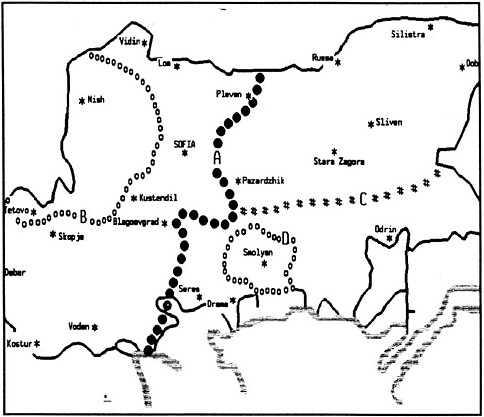
Boundaries of the Bulgarian Language as published in Leipzig - 1929. Main dialects: [A] E-W; [B] N-W; [C] OLD S-E; [D] Central Rhodope
4. THE LANGUAGE
The well known boundary of the "YA" (Yatova Granitsa) divides the Bulgarian nation into the Eastern and Western dialects, and also passes through Macedonia. Therefore it is obvious that no common separate Bulgarian dialect exists for all the Macedonian region. On this issue we are guilty of supporting invalid conclusions which at times are construed or distorted to justify the existence of an "unique" Macedonian language.

Boundaries of the Bulgarian Language as published in Leipzig - 1929.
Main dialects: [A] E-W; [B] N-W; [C] OLD S-E; [D] Central Rhodope
The Skopje literary Macedonian language however is something quite separate. The genesis of this new literary language from basic Bulgarian is explained by the linguist Professor Konstantin Popov in "From the History of the Bulgarian Literary Language" (1985). The truth, which is quite apparent to us all, is that the so-called literary Macedonian language, except for its dialectic Bulgarian foundations, is a carefully designed and manipulated product aimed at ultimate dialectic fusion with the Serbian language. Convincing proof of this claim is evident when we consider the language of the Bulgarians of Banat in Romania. These people, for centuries lived in the realm of the Austro-Hungarian Empire, isolated from Bulgaria, within a
![]()
10
Catholic faith and using a Latin alphabet, with ancient words of which 22% were foreign. Yet today they still call their language "Bulgarian" and proclaim an absolute Bulgarian national consciousness. Significantly coercion was not a problem, unlike the current situation in Macedonia.
We must also reiterate that the countless periodicals, magazines and pamphlets of the MLM, as well as all publications in the occupied Macedonian lands and in Bulgaria itself (from before the Liberation to 1941) are written in the Bulgarian literary language. Notwithstanding the latter, immeasurable peculiarities of the Macedonian speech, like the syntax, phonetics and grammar (for example the triple article) are common features of Bulgarian, used in Moesia and in Thrace but not entering directly into the literary language.
Another issue on this theme concerns parts of the language in today's
Kosovo, and the Serbian lands from the city of Prizren to the River
Timok which have Bulgarian traits. Accordingly, linguistic theorists
categorise them as separate dialects from the Serbo-Croatian language.
However in reality this unique phenomenon not only establishes the historic
evolution of these lands but also supports the historic and linguistic
claims of the Bulgarian nation. To this population belong the Gorans
(Goranite) who live north-west of the Shar mountain in Kosovo
and speak only Bulgarian. In fact they are akin to the Bulgarian-Mohammedans.
But now within Yugoslavia they quarrel whether these people are "Macedonian",
Serbian or Albanian.
[Previous] [Next]
[Back to Index]